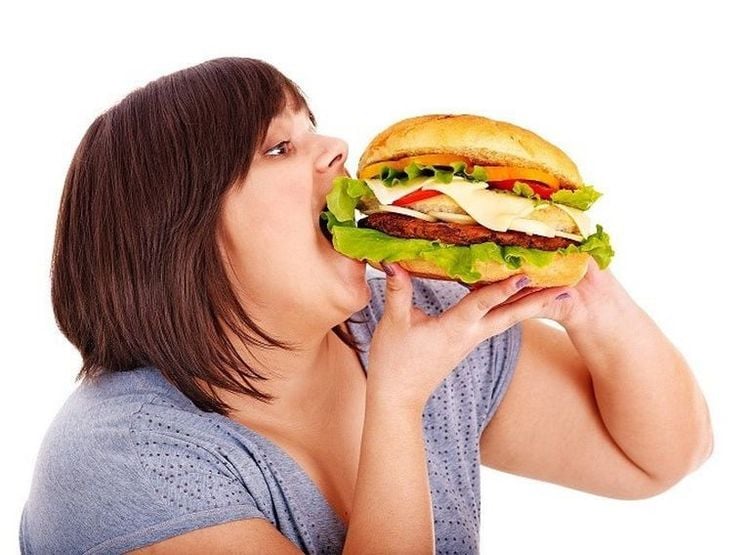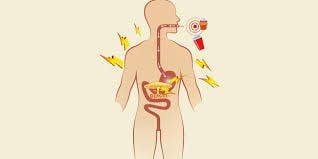This is an automatically translated article.
Every day the stomach will have to secrete about 8000 mg of fluid to digest all the food that people take in. Eating too full will cause the stomach to swell, the bowel movements will slow down, the digestive juices will not be secreted enough and thereby lead to the food not being fully digested.
1. Reasons for overeating
In life, there are many reasons why people can't control their behavior and lead to overeating, specifically the following cases:
Eat buffet: The buffet is very rich in food, plus adding the mentality that people think that they have to eat for the amount of money they have spent, leading to eating too much, beyond the control of the body. Meetings: Friends or family gatherings make people feel excited and excited, which leads to overeating. Work is too busy: People whose work is too busy will have a habit of eating in a hurry. Science has proven, the time from the beginning of putting food in the mouth until the brain receives the information of satiety is about 20 minutes. Therefore, people who eat a meal in less than 10 minutes are very likely to fall into a state of overeating before the brain picks up that signal. In the morning, the pressure of work is too much, making people eat and drink in a way, in the evening, they are more comfortable, they eat more deliciously, so they have more energy than lunch and breakfast, as a result, they eat too much. full at dinner.
2. Harm of overeating
The stomach is the first place to receive the consequences when people eat too much. Every day, this part will have to secrete about 8000 mg of fluid to digest all the food loaded into the body. Eating too full will cause the stomach to be distended, bowel movements slow down, digestive juices are not secreted enough, thereby leading to food not being able to fully digest, over time will cause harmful effects such as: Eating too full causes discomfort in the stomach, bloating Usually, the food you eat will be converted into energy and nutrients needed to feed the body. However, if you eat too much, the organs in the digestive system will have to work excessively, at full capacity and affect the process of digesting food. In fact, some people who eat too much have diarrhea because their bowel movements are stimulated after the digestive system is overloaded.
Besides, in parallel with swallowing food, the body also receives a certain amount of air into the abdomen. Eating too much food also means swallowing more air. This will make you feel uncomfortable, bloated, at this time the best way to release gas in the stomach is to walk.
Overeating makes the body feel hotter When you eat too much than usual, the body's metabolism will also be promoted at a rapid rate, causing the heart rate to increase faster, sweat sweat a lot and the body will feel hotter. After the metabolism ends, everything will return to normal, however, if you want to be more comfortable, you can take a cool shower to cool down.
Eating too full causes insomnia If you don't want to be restless and lose sleep, it's best not to eat too much in the evening or stop eating when it's almost bedtime.
Eating too full makes dizziness In addition to making it difficult for the body to sleep, eating too much also causes dizziness, the reason is that eating too much will cause food digestion, metabolic rate and heart rate to increase. faster.
Eating too full makes the body tense, difficult to concentrate If eating too full, the body will release the hormone insulin. This hormone is responsible for storing excess sugar for the purpose of preventing low blood sugar levels. The extra release of the hormone insulin can cause blood sugar levels to drop, causing feelings of stress, lethargy, and inability to concentrate.
Overeating makes the belly bloat The most noticeable change after eating too much is the increased belly size, bloat. However, you should not be too worried because after the food has been digested, the stomach will shrink to its normal size.

Việc ăn quá no có thể dẫn đến hậu quả thức ăn không thể tiêu hóa hết
3. The secret to not being too full
Overeating can cause immediate and long-term harm to the human body. Therefore, to limit overeating, each person needs to do the following:
Eat slowly, chew thoroughly: According to research, the brain's response time to eating is based on weight. body volume. Therefore, eating slowly and chewing thoroughly will help the brain have enough time to produce the response of whether or not it is full, thereby avoiding overeating. Concentrate during eating: While eating, it is best not to be distracted, not to eat while watching TV or playing games, talking... During daily meals, it is best not to think. much, should only focus on eating. Enjoy the delicious taste of the first bites: The best feeling is when you eat the first pieces, then the taste can change and lose sensitivity. Therefore, when eating should focus on enjoying the delicious taste of food in the first few bites so as not to overeat. Eat with small plates: Using small dishes can help us not to eat too much food. However, it is also necessary to adjust the amount of food in the bowl to help the brain improve its attention to food and thereby estimate the amount of food is appropriate or not. Eat foods that are easy to fill: According to research, a person should not eat too many high-calorie foods, but should only eat foods rich in fiber, water and protein to feel full quickly, satisfy I don't eat much, but I feel full and the amount of calories put into the body is not too much. In short, everyone should eat slowly, chew thoroughly to reduce pressure on the stomach and absolutely should not load too much food into the body to avoid unwanted harm.
Please dial HOTLINE for more information or register for an appointment HERE. Download MyVinmec app to make appointments faster and to manage your bookings easily.













